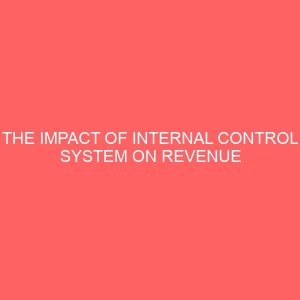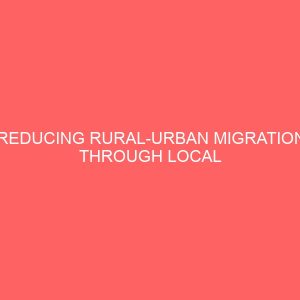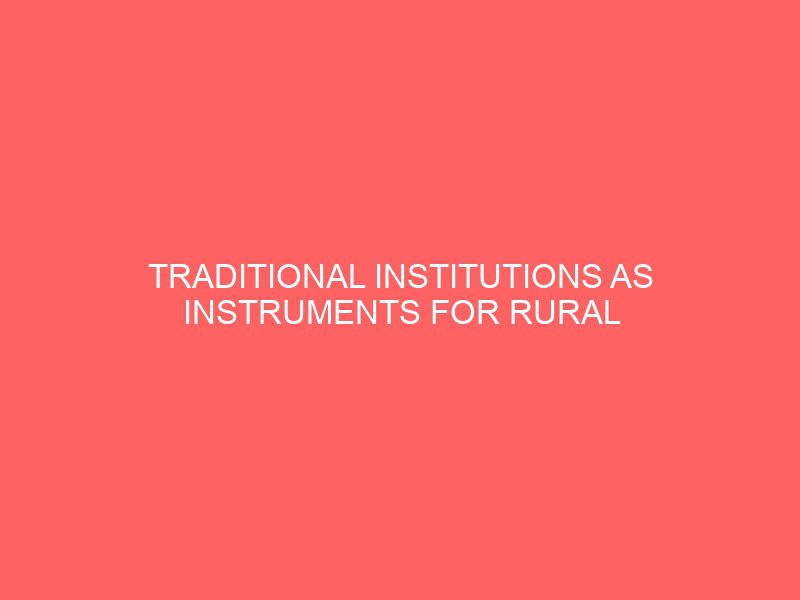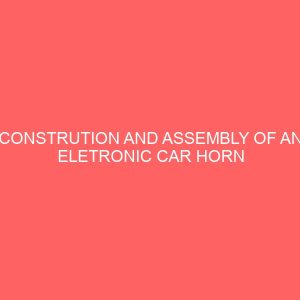Description
ABSTRACT
This research work is an attempt to examine the prospects and part played by traditional rulers in community development in Awomama. The objectives of the study are targeted at finding out the community development projects carried out, and assessing the extent of traditional rulers involvement in community development. In the course of the research, four hundred questionnaires were administered based on cluster sampling techniques, where the districts were grouped into smaller unit covering the study area. In the end, the study discovered that traditional rulers in Awomama indeed participated in community development projects. The research came up with some recommendations, through which an effective development will be carried out in Awomama.
CHAPTER ONE
INTRODUCTION
1.1 Background of the Study
The role of traditional institutions such as traditional rulers, Town Unions or community association Age grades, the Umuada and women Development groups in Nigeria with the particular reference Awomama, Orlu East in Imo State. This institutions and agencies act as instrument for coordinating various social economic activities within such a society and between it and other aims traditional institutions have been social agents as well as mass mobilization facilitators in various communities in Nigeria. Traditional rulers more often than not, negatively affects the development effort of the people. Traditional institutions should be working cooperatively and collaboratively, and not as cross purposes each of the institutions should confine itself within its area of influence, so that their effort towards the development of their area could be optionally utilized. The traditional institution should be people centered and development Oriented in their mission and vision.
Historical reflection often points to the immutable fact that before the advent of Europeans in Nigeria. The various ethnic groups such as Igbo people, Hausa people and Yoruba people had various strategies for organizing the public affairs of their people as well as ensuring progress and development in their respective areas. There were traditional institutions through which public affairs of the people were organized. In Igbo land the traditional institution are the Umuadas, the Age grades, traditional rulers and Town Union.
The Umuadas
In the precolonial era, among the Igbo people women were held sacred and they participated in collective decisions making on certain sensitive issues that touched on their interest. They do this through an institutional group known as Otu Umuada members the Otu Umuadas were dynamic, powerful and were well respected by their communities they were at times regarded by some guardians of the village traditions the Umuadas often intervened whenever the constitution of the village were violated and they impose sanction on offenders.
Traditional Rulers
The word traditional rulers entail the reign of a monarchy or a titled ruler vested with that activity to rule over a people in their affairs of life therefore traditional institutions are headed by traditional rulers and these institutions are very vital in bringing development closer to the rural people. Traditional have succeeded in boosting community development through the provisions of bore holders, rural roads, formation of cooperative societies, setting up markets, constructions of culverts, constructions of earth dams, mobilizing people for health programmes and residing disputes within their domains. Traditional rulers are the major people provided; they are answerable to a title ruler vested with the authority of governing the affairs of the people.
Town Unions
The tempo reached its crescendo in Igbo land after the civil war when almost all, public facilities such as markets town halls I maternity homes, dispend same and schools were all damaged as a result of the war because of their well known flair for providing amentias for themselves out of communal funds, all these people started from the 1970 to rebuild their schools, health facilities, markets etc. the town union because very necessary for rural development because the people were neglected by the government the town unions are to disseminate information about government policies, mould public opinion, raise fund, expand and extend the utilities, undertake and encourage group farming activities and also help in the maintenance of law and order.
These are to signify how effective the traditional instructions work for the development of the society.
1.2 STATEMENT OF RESEARCH PROBLEM
The traditional institutions in Awomama, Orlu East in Imo State, knowing well of their role and expectations in their area of jurisdiction most often deviate from these roles and expectation which brings about change and usher the community into development. For example instead of the traditional institutions to focus on the needs of the people such as provisions of schools, good reads, pipe borne water etc they do not do it rather deviate if from and think about themselves and their own agenda which do not bring about development in Awomana.
1.3 OBJECTIVES OF THE STUDY
The aim and objectives of this study include:
a To know the extent of the involvement of traditional rulers in the community development.
b To suggest ways to improve and encourage traditional rulers in development projects.
c To fund out the constraints faced by traditional ruler in community development project in Awomama, Orlu East Imo State.








Reviews
There are no reviews yet.